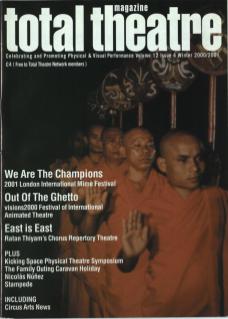This is a great and friendly festival, centred round the town square. The imaginative programme runs twelve hours a day for a week and includes shows for kids and adults, bands, dance and circus, Czech and foreign work.
The festival opened with a disappointing medley of mime and clown acts. With the occasional exception, this felt like cabaret night at a trapist sixth form college. Corn Factory's street dance fairytale, Sedm let Stesti, and the weak Cirque Batard of Cahin-Caha were eclipsed by Teatr Novogo Fronta's Vagabond Adam Kadmon. Full of old-school fire and adrenaline, this show walks an 'everyman' through state terror into the arms of the post-communist Russian Mafia.
The earnest efforts of a young Intent Theatre to convey some similar tale of oppression in Pootevreny Soumrak were undermined by a lack of control of their material. They strike familiar poses but are unable to take possession of them. The Forman Brothers converted a vast barge into a luxury floating theatre for their new show Nachové Plachty. This fairytale of a girl brought up by her sailor father after her mother's tragic death is told with incredible visual flair and narrative incoherence. Its lush theatrical vision is stunningly realised in its mixing of puppets, set, actors and shadow play. The first half is a delight. The second half, made almost nonsensical by plot lacunas, induces thoughts of mutiny.
Perhaps the festival's finest moment was Herzség, a show commissioned from Sco. Stage Code for a beautiful old spa building. The company of five utilised the building's facade and cloakroom but sited most of the action in and around the drained pool. Aspiring towards the dance theatre of Pina Bausch, the piece is full of ideas – many great, some sublime, and a number that seem superfluous. When they tap strongly into the space's strange haunted atmosphere, it's wonderful stuff. Ultimately this show is, like the festival as a whole, ambitious and rewarding, not universally triumphant, but deserving praise and respect.

